Related Research Articles

Billy Wilder was an Austrian-born filmmaker and screenwriter. His career in Hollywood spanned five decades, and he is regarded as one of the most brilliant and versatile filmmakers of Classic Hollywood cinema. He received seven Academy Awards, a BAFTA Award, the Cannes Film Festival's Palme d'Or and two Golden Globe Awards.

Joseph Leo Mankiewicz was an American film director, screenwriter, and producer. Mankiewicz had a long Hollywood career, and won both the Academy Award for Best Director and the Academy Award for Best Adapted Screenplay in consecutive years for A Letter to Three Wives (1949) and All About Eve (1950), the latter of which was nominated for 14 Academy Awards and won six.

The New Wave, also called the French New Wave, is a French art film movement that emerged in the late 1950s. The movement was characterized by its rejection of traditional filmmaking conventions in favor of experimentation and a spirit of iconoclasm. New Wave filmmakers explored new approaches to editing, visual style, and narrative, as well as engagement with the social and political upheavals of the era, often making use of irony or exploring existential themes. The New Wave is often considered one of the most influential movements in the history of cinema.
The Magical Negro is a trope in American cinema, television, and literature. In the cinema of the United States, the Magical Negro is a supporting stock character who comes to the aid of white protagonists in a film. Magical Negro characters, often possessing special insight or mystical powers, have long been a tradition in American fiction. The old-fashioned word "Negro" is used to imply that a "magical black character" who devotes himself to selflessly helping whites is a throwback to racist stereotypes such as the "Sambo" or "noble savage".
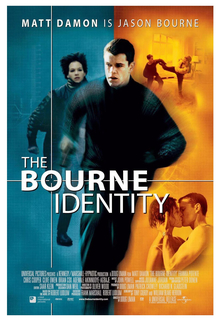
The Bourne Identity is a 2002 action-thriller film directed by Doug Liman and written by Tony Gilroy and William Blake Herron. Based on Robert Ludlum's 1980 novel of the same name, it is the first installment in the Bourne franchise, and the film stars Matt Damon, Franka Potente, Chris Cooper, Clive Owen, Brian Cox, and Adewale Akinnuoye-Agbaje. In the film, Jason Bourne (Damon) suffers from psychogenic amnesia and is forced to fight to unlock his identity and his mysterious connection to the CIA.
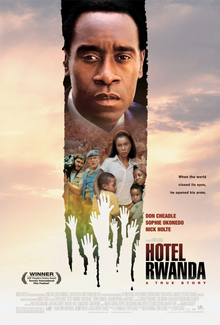
Hotel Rwanda is a 2004 docudrama film co-written and directed by Terry George. It was adapted from a screenplay by George and Keir Pearson, and stars Don Cheadle and Sophie Okonedo as hotelier Paul Rusesabagina and his wife Tatiana. Based on the genocide against the Tutsi in Rwanda, which occurred during the spring of 1994, the film documents Rusesabagina's efforts to save the lives of his family and more than 1,000 other refugees by providing them with shelter in the besieged Hôtel des Mille Collines. Hotel Rwanda explores genocide, political corruption, and the repercussions of violence.

Clear and Present Danger is a 1994 American action thriller film directed by Phillip Noyce and based on Tom Clancy's 1989 novel of the same name. It is a sequel to The Hunt for Red October (1990) and Patriot Games (1992) and part of a series of films featuring Clancy's character Jack Ryan. It is the last film version of Clancy's novels to feature Harrison Ford as Ryan and James Earl Jones as Vice Admiral James Greer, as well as the final installment directed by Noyce.

Paul Greengrass is an English film director, film producer, screenwriter and former journalist.
Third Cinema is a Latin American film movement that started in the 1960s–70s which decries neocolonialism, the capitalist system, and the Hollywood model of cinema as mere entertainment to make money. The term was coined in the manifesto Hacia un tercer cine, written in the late 1960s by Argentine filmmakers Fernando Solanas and Octavio Getino, members of the Grupo Cine Liberación and published in 1969 in the journal Tricontinental by the OSPAAAL.

Charlie Wilson's War is a 2007 American biographical comedy-drama film based on the story of U.S. Congressman Charlie Wilson and CIA operative Gust Avrakotos, whose efforts led to Operation Cyclone, a program to organize and support the Afghan mujahideen during the Soviet–Afghan War (1979–1989).
The Sum of All Fears is a 2002 American spy thriller film directed by Phil Alden Robinson, based on Tom Clancy's 1991 novel of the same name. The film, which is set in the Jack Ryan film series, is a reboot taking place in 2002. Jack Ryan is portrayed as a younger character by Ben Affleck, in comparison with the previous films: The Hunt for Red October (1990) starring Alec Baldwin as Jack Ryan and the sequels, Patriot Games (1992) and Clear and Present Danger (1994), both starring Harrison Ford in the role.
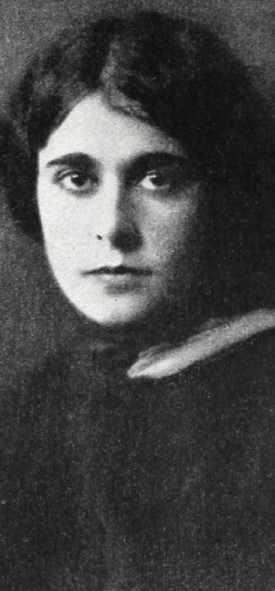
Frederica Alexandrina Sagor Maas was an American dramatist, playwright, screenwriter, memoirist, and author, the youngest daughter of Jewish immigrants from Russia. As an essayist, Maas was best known for a detailed, tell-all memoir of her time spent in early Hollywood. A supercentenarian, she was one of the oldest surviving entertainers from the silent film era.
Charles Cumming is a British writer of spy fiction and a screenwriter.
An auteur is an artist with a distinctive approach, usually a film director whose filmmaking control is so unbounded and personal that the director is likened to the "author" of the film, thus manifesting the director's unique style or thematic focus. As an unnamed value, auteurism originated in French film criticism of the late 1940s, and derives from the critical approach of André Bazin and Alexandre Astruc, whereas American critic Andrew Sarris in 1962 called it auteur theory. Yet the concept first appeared in French in 1955 when director François Truffaut termed it policy of the authors, and interpreted the films of some directors, like Alfred Hitchcock, as a body revealing recurring themes and preoccupations.
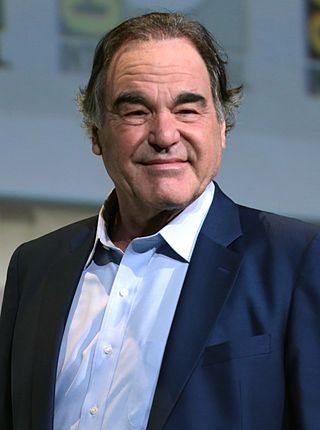
William Oliver Stone is an American filmmaker. Stone is known as a controversial but acclaimed director, tackling subjects ranging from the Vietnam War, and American politics to musical biopics and crime dramas. He has received numerous accolades including four Academy Awards, a BAFTA Award, a Primetime Emmy Award, and five Golden Globe Awards.
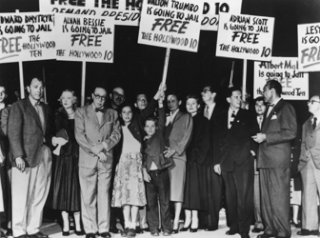
The Hollywood blacklist was an entertainment industry blacklist put in effect in the mid-20th century in the United States during the early years of the Cold War, in Hollywood and elsewhere. Actors, screenwriters, directors, musicians, and other American entertainment professionals were barred from work by the studios.
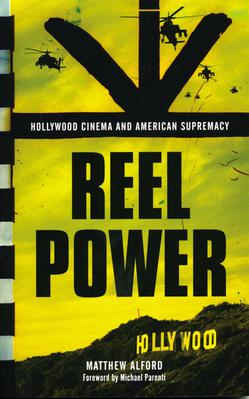
Reel Power: Hollywood Cinema and American Supremacy is a 2010 book by Matthew Alford, which argues that even many of the most politically subversive films, such as Hotel Rwanda, Thirteen Days and Three Kings, provide favourable mythology for the United States' government. Alford draws attention to the power of corporate moguls and the role of the government in the production of films, such as Black Hawk Down, Terminator Salvation, and Transformers. The book is based on Alford's PhD thesis, which applied Edward S. Herman and Noam Chomsky's Propaganda Model to the motion picture industry. Published in English by Pluto Press with a foreword by Michael Parenti, French translations then appeared in August 2018 and April 2023 which contained new introductory material by the author.

The Writer with No Hands is a 2017 British documentary feature film, which follows unemployed academic Matthew Alford as he tries to establish that the accidental death of Hollywood screenwriter Gary DeVore was, in fact, an assassination by the United States government.

Theaters of War is a 2022 American documentary film that examines the influence of the Pentagon and CIA in shaping Hollywood and television scripts, making use of the Freedom of Information Act to acquire internal state files. The film also features interviews with academics, government officials, veterans, and industry players including Oliver Stone.
References
- ↑ "FT266 - FT Covers". ft.gjovaag.com.. "FT248 - FT Covers". ft.gjovaag.com.
- ↑ Gane, Thomas (5 May 2016). "The Mystery of the Dead Hollywood Screenwriter Whose Hands Were Never Found". Vice. Retrieved 21 August 2023.
- ↑ White, Mike. "Special Report: The Writer with No Hands (2017)".
- ↑ "Op-Ed: Why does the Pentagon give a helping hand to films like 'Top Gun'?". Los Angeles Times . 30 May 2022.
- ↑ Wimperis, John (11 June 2024). "General Election 2024: Full list of candidates for Bath". Somerset Live. Retrieved 24 June 2024.